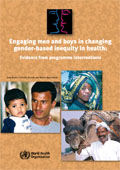WHO report:
Changing men's behaviour can improve women's health
By innovative and well designed programs it is possible to involve men in changing sexist, risky and violent behaviour. This is the conclusion of a WHO report which has reviewed 58 programs aimed at engaging men in changing male identity and behaviour.
The report, Engaging men and boys in changing gender-based inequity in health, found that almost a third of the 58 programmes evaluated were successful in encouraging men to end violence against women, to care for their pregnant wives and children, and to take steps to prevent infecting their partners with HIV or becoming infected themselves. Such changes in men’s behaviour prove to benefit not only women, but also boys, men and the community at large. “
Gender [behaviour] transformation allowing women and men to discuss and decide on health, when that may not typically be the case, is the gold standard,” said Dr Peju Olukoya, Integrating Gender into Public Health unit coordinator at the launch of the WHO report. Unequal power relations between the sexes affect women’s health, she said: “In some places women cannot even seek health care unless they get permission from a man.”
Brief presentation of the report in the WHO Bulletin.
A global network of organizations working with men to change men is now being established; MenEngage. More information here at their web site.
RELATED ARTICLES
- New report highlights benefits of policy measures to prevent harmful alcohol consumption
- Highlighting the COVID-19 – alcohol connection
- Alcohol among risk factors increasing
- WHO Launches Global status report on alcohol and health 2018
- Effective alcohol policies are needed now to yield health benefits in the future
- New publication on violence and alcohol
- Intervention gives reduced drinking, aggression and violence
- An invitation to men to discuss masculinity and drinking habits
- Powerful reminders of the many real effects of alcohol consumption
- Alcohol use a significant cancer risk factor

